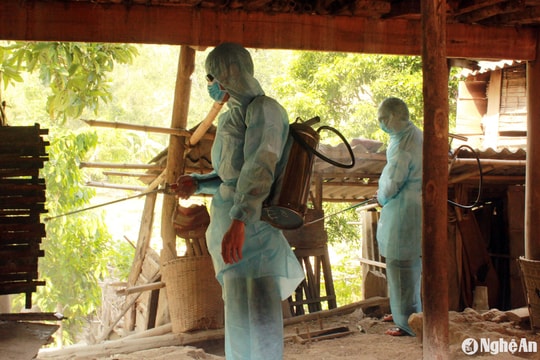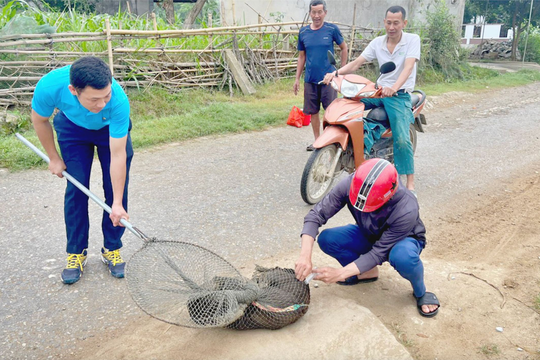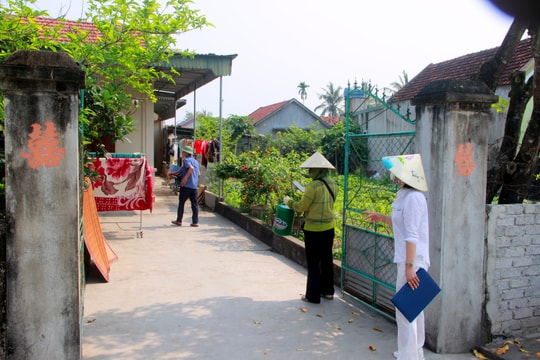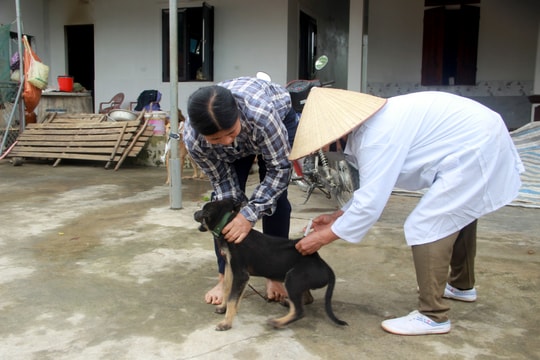Nghe An highland districts make efforts to prevent African swine fever
Currently, the risk of African swine fever outbreaks is high. In some mountainous districts of Nghe An, the epidemic has appeared. Therefore, authorities at all levels and people are actively zoning to contain the epidemic.
Epidemic control in villages and hamlets
Na Kho village of Nga My commune, Tuong Duong district is about 70km from Thach Giam town. The main source of livelihood of the people of Xop Kho village is livestock and farming, in which raising buffalo, cows and pigs plays a key role. Although nearly 20km from the center of Nga My commune, Xop Kho is one of two villages where African swine fever has occurred.
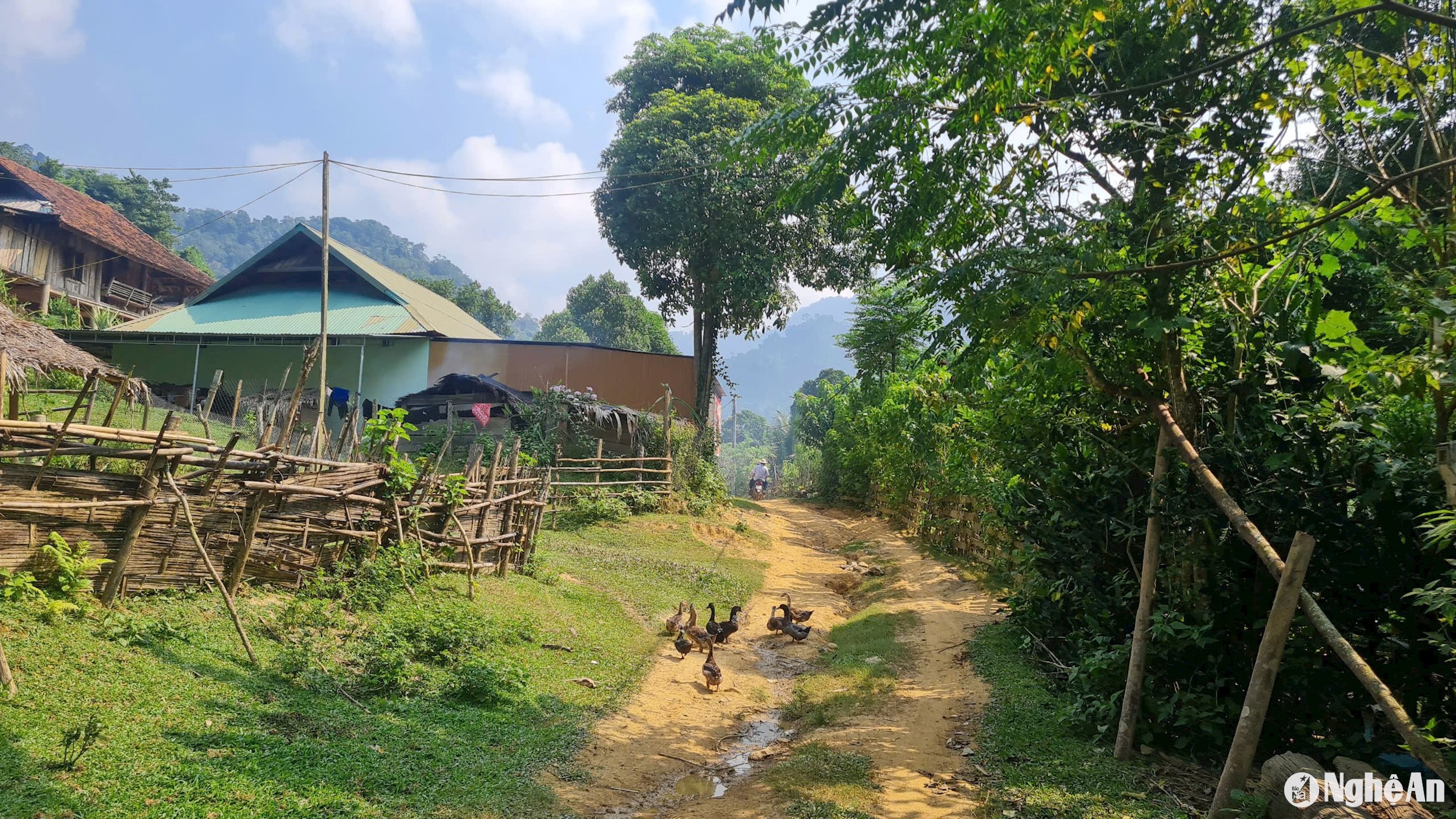
On October 9, Mr. Kha Van Thu - Vice Chairman of Nga My Commune People's Committee said that in early September 2024, African swine fever broke out in Canh and Xop Kho villages. The number of pigs killed by the disease in the two villages has reached 125. The Commune People's Committee has been actively directing people to destroy dead sick pigs in accordance with regulations and propagandizing people to implement measures to prevent and control the disease, limiting its spread.
The entire Nga My commune has a total herd of over 1,000 pigs. To promptly prevent the spread of African swine fever, people in villages and hamlets in Nga My commune are following the recommendations and instructions of the Commune People's Committee to isolate and contain the epidemic, and not buy and sell pork products from other localities. At the same time, the management boards of the villages and hamlets also restrict street vendors from entering the villages and hamlets.
“On inter-commune and inter-village routes where African swine fever has occurred, we have set up guard posts to prevent vehicles carrying goods, especially pork, from other places from entering. At the checkpoints, lime and disinfectant chemicals are spread to prevent and control African swine fever pathogens. In addition, the commune has also implemented spring livestock vaccination. As of the end of September 2024, 1,250 out of 2,348 buffalo and cows have been vaccinated; 300 dogs have been vaccinated; 190 pigs have been vaccinated out of 1,000,” said Mr. Kha Van Thu.

In Tuong Duong district, in addition to 2 villages in Nga My commune, African swine fever outbreaks have appeared sporadically in villages of Yen Tinh, Yen Na, and Luu Kien communes. The total pig herd in Tuong Duong district is over 25,800, mainly raised in people's production areas, and is a major source of income for households. Therefore, Tuong Duong district is implementing zoning and epidemic control to prevent the spread. In other districts such as Ky Son and Anh Son, African swine fever has also appeared in some localities.
In Ky Son district, a small number of pigs died from African swine fever in Na Loi commune, and the locality has isolated and controlled the epidemic. In Anh Son district, 6 out of 10 communes have had pigs die from African swine fever, with the number reaching hundreds. For example, in Cao Son commune, there were 2 outbreaks, killing 7 pigs. Other communes such as Vinh Son, Hoa Son, Phuc Son... have also had the epidemic.
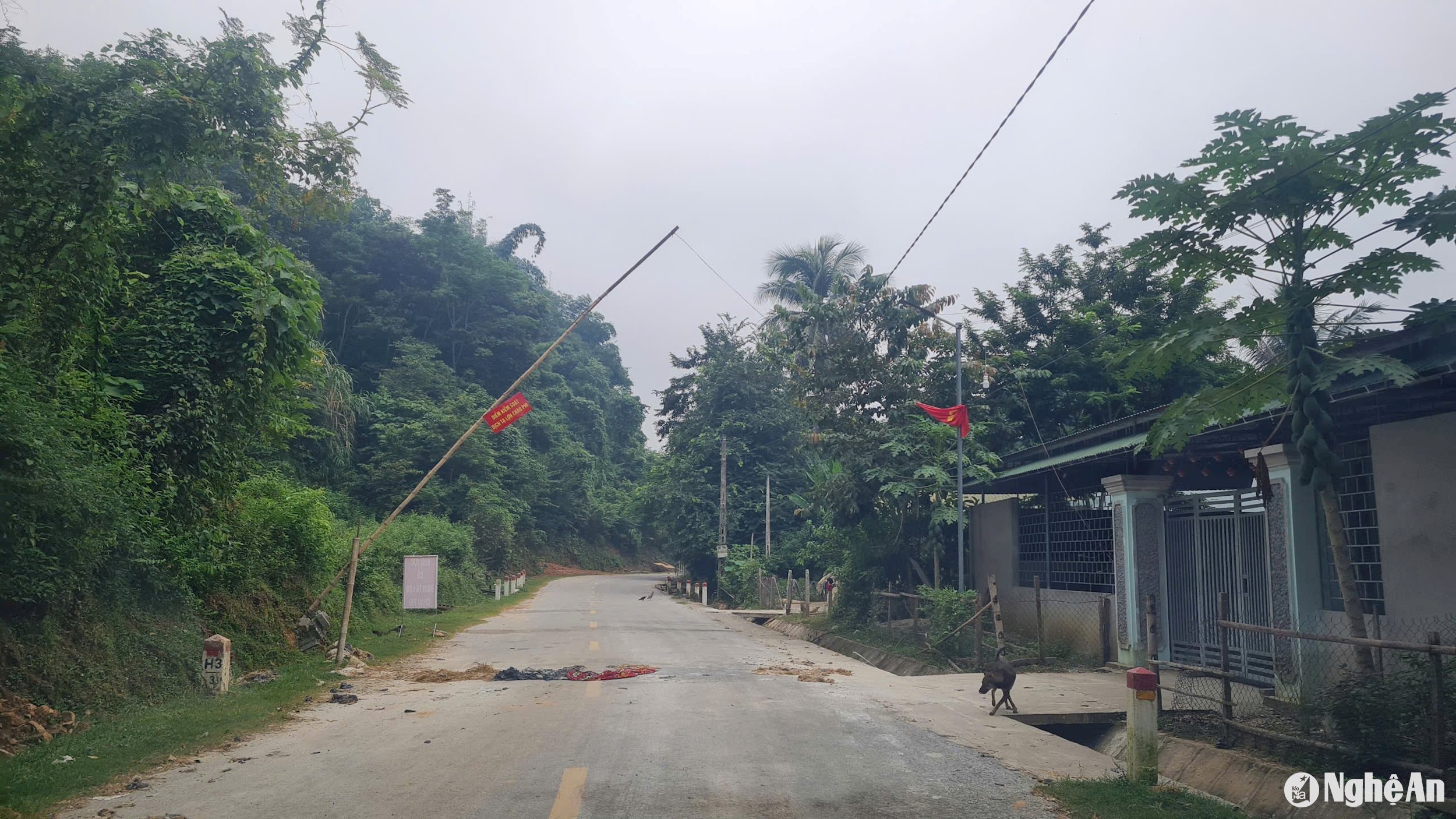
On the morning of October 11, Mr. Le Van Tri - Head of the Department of Agriculture and Rural Development of Anh Son district said that the district People's Committee is sending working groups to communes to direct disease prevention and control in livestock herds. Households with pigs that died due to the disease are instructed to destroy them according to regulations. Communes set up checkpoints to prevent the spread.
Be proactive and strictly comply with epidemic prevention and control measures
Que Phong is one of the localities where African swine fever has occurred on a large scale in 11 communes. Mr. Nguyen Manh Cuong - Deputy Director of the Agricultural Service Center of Que Phong district said that from the beginning of 2024 until now, African swine fever has occurred in 22 villages and hamlets with more than 100 pig-raising households affected, causing more than 10 tons of pigs to die and be destroyed. "Up to now (October 11), Que Phong district still has 3 communes and towns with African swine fever outbreaks that have not passed 21 days, namely Chau Thon, Dong Van and Tien Phong communes. Scattered in some other communes, the epidemic has occurred but the number is small, only one household such as in Dong Van, Kim Son town".
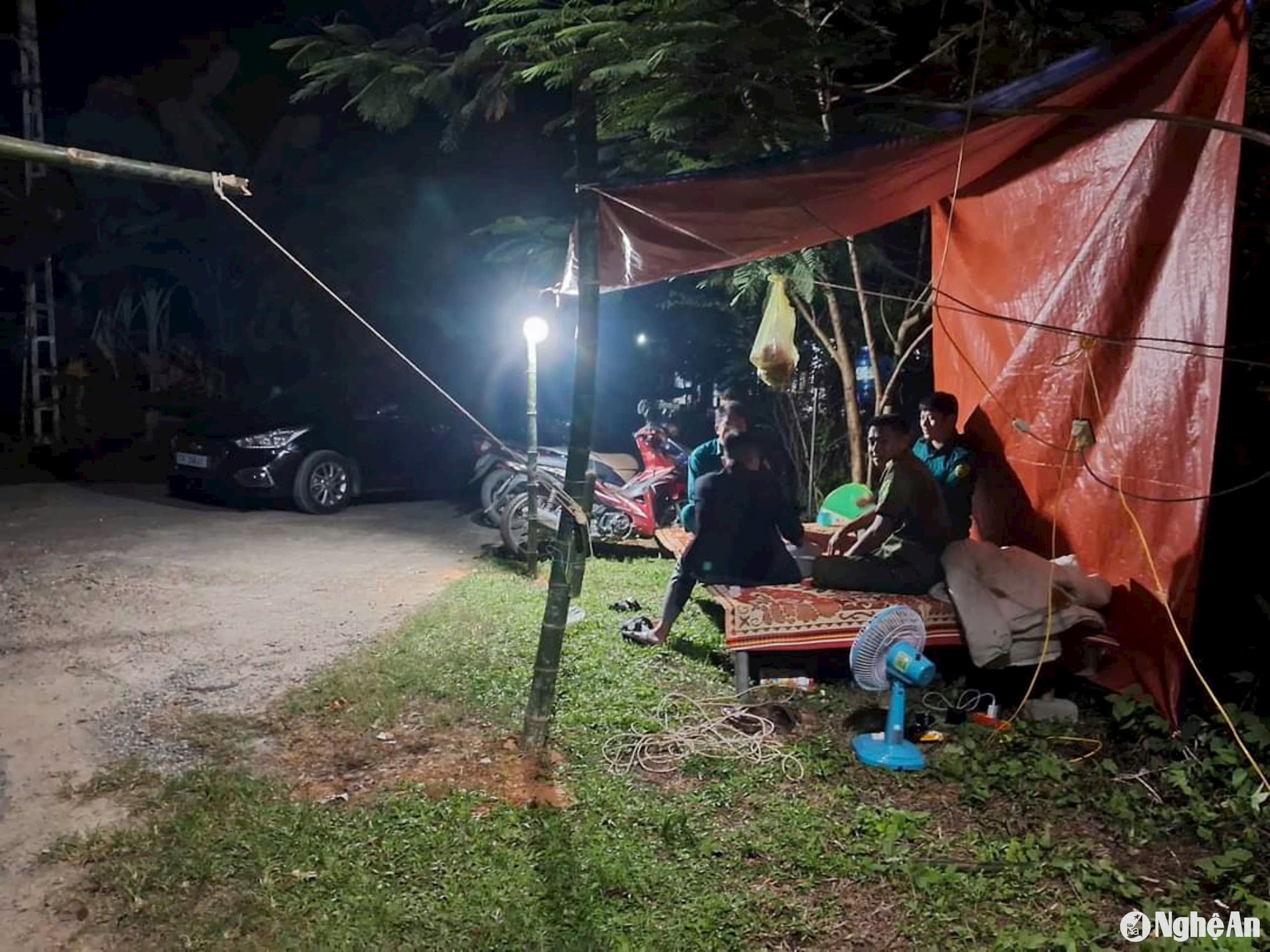
Officials from the Department of Agriculture and Rural Development of Que Phong district also added that African swine fever is a disease that is difficult to control and spreads quickly, and it is difficult to completely eliminate the pathogen if people lack awareness and do not strictly comply with disease prevention and control measures. Specifically, when an outbreak occurs, it is necessary to isolate barns and livestock, and limit people entering and leaving areas with infected pigs.
In addition, when farmers enter epidemic-affected barns, they must also ensure that they disinfect their personal belongings; clean the barns daily and after each feeding. For pigs that die from the epidemic, in addition to proper burial, the barn area and the burial site for sick livestock must still be disinfected continuously for at least 7 days, with lime and disinfectant solution sprinkled in the correct dosage and within the prescribed range.
To minimize damage and prevent the spread of the disease, all levels and sectors in Que Phong district have coordinated forces to control people and vehicles entering and leaving epidemic areas and inter-commune and hamlet areas at risk. There have been a number of cases of street vendors violating regulations on disease prevention and control that have been punished by local authorities. The Steering Committee for Animal and Poultry Disease Prevention and Control in Que Phong district has also asked households to sign a commitment to strictly implement disease prevention and control and to punish those who do not comply.
Also implementing disease prevention and control measures according to the general direction of the Department of Animal Husbandry and Veterinary Medicine, all levels and sectors in other localities, in addition to regular propaganda on the loudspeaker system, through group channels, local authorities have established steering committees, set up quarantine checkpoints and sent working groups to the grassroots to grasp the situation, support timely direction, and limit the spread of the disease. For example, in Yen Hoa commune (Tuong Duong), although African swine fever has appeared in neighboring localities, the livestock in the commune is still partly safe thanks to timely prevention.
Mr. Lo Van Tham - Head of Yen Tan village, Yen Hoa commune said that when there was information about African swine fever in neighboring communes, following the direction of the People's Committee of the commune, the village sent a working group to remind households to sprinkle lime for disinfection and increase animal feed to increase the ability to prevent the disease. In addition, livestock households also voluntarily restricted people from entering the livestock area and used protective gear when entering the barn. Thanks to that, up to now, Yen Tan village has 149 households, most of which raise pigs, but there has been no phenomenon of livestock being infected with the disease.

Officials from the Department of Agriculture and Rural Development of Tuong Duong district said that in addition to regularly propagating and guiding local communes and villages to implement regulations on preventing and controlling African swine fever, the district is speeding up the progress of vaccination against the disease in the spring season for livestock and poultry. The total pig herd of the district has reached over 25,800 heads. Up to now, the district has deployed vaccination against livestock and poultry in the spring season of 2024 with a total of 46,251 doses of various vaccines. Of which, 2,650 doses of vaccine have been injected to prevent and control African swine fever.

